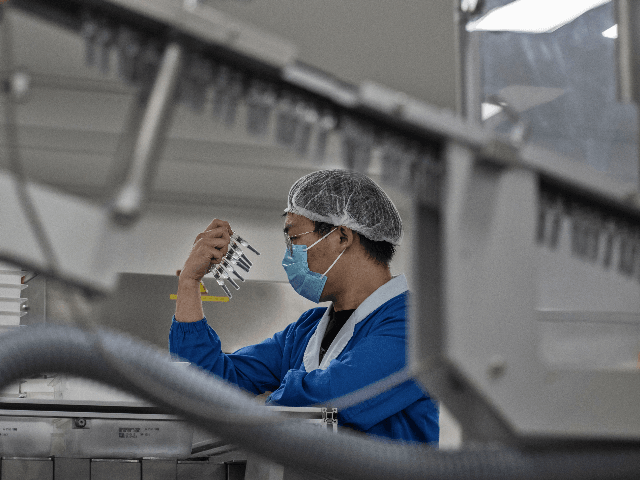More than 75 percent of Taiwanese would not receive a Chinese-made coronavirus vaccine candidate, according to the results of a recent survey released Tuesday.
The Taipei-based Association of Chinese Elite Leadership conducted the survey by telephone among 1,069 Taiwanese people aged 20 and over from March 5-7. According to the pollster, “76.1 percent of the respondents said they are unwilling to accept Chinese-made vaccines, with only around 19 percent saying they would do so.” The survey found that 42 percent of respondents who said they would accept Chinese-made vaccines self-identified as members of Taiwan’s pro-China opposition party, Kuomintang (KMT).
Among the survey’s respondents, 28.5 percent described themselves as supporters of Taiwan’s ruling Democratic Progressive Party (DPP), which opposes Chinese influence in Taiwan. Another 18.6 percent of respondents said they supported the pro-China KMT party.
Just 24.9 percent of the survey’s respondents said they were open to the import of Chinese-made coronavirus vaccines to Taiwan, while 61.6 percent of respondents said they opposed the idea, Taiwan’s Central News Agency (CNA) reported on March 9.
Taiwan’s Minister of Health and Welfare, Chen Shih-chung, has repeatedly said Taiwan will not import Chinese-made coronavirus vaccines, “citing a lack of data on their efficacy and safety, as well as restrictions under current laws,” CNA noted on Tuesday.
Coronavac, a Chinese coronavirus vaccine candidate developed by China’s state-run pharmaceutical company Sinovac Biotech, was approved for emergency use in Hong Kong last month despite its efficacy rate of 50.38 percent. At least three Hong Kong residents have died in recent days shortly after receiving doses of CoronaVac as part of the city’s coronavirus vaccination drive. Hong Kong health officials say they are investigating the third death, reported on March 8, to determine if there was any direct link between the death and Coronavac. The city’s health ministry has reportedly blamed the first two fatalities on the patients’ pre-existing health conditions and said that Coronavac was not directly responsible for their deaths.
At least two Hong Kong residents were admitted to intensive care units (ICUs) between March 6 and 7 after recently receiving doses of Coronavac, the Hong Kong health department confirmed.
Chinese health authorities have not recommended Coronavac for use among people aged 60 or over in China. Despite this, Hong Kong health officials approved the vaccine candidate for emergency use in the city in February “after a decision by local authorities to waive a requirement for developers to publish its final-stage trial results in peer-reviewed medical journals,” according to Hong Kong Free Press.

COMMENTS
Please let us know if you're having issues with commenting.